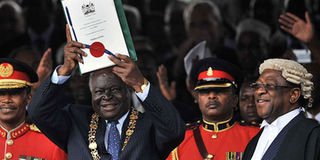When state security comes before liberties

President Mwai Kibaki publicizes the new Constitution at Uhuru Park, Nairobi, on August 27, 2010. PHOTO | TONY KARUMBA | AFP
What you need to know:
- In Kenya, we operate in a landscape where instability lurks in a volcano of political ambition fuelled by negative ethnicity and extreme poverty.
- Kenyans passed the 2010 Constitution to grant themselves a better quality of life through predictable social stability.
In modern times, there has been a constant use of the doctrine of national security by despots to suppress civil liberties in order to cover up for crimes against citizens, leading to kleptocratic misrule.
In such countries, the doctrine of separation of powers and the independence of the governing bodies, such as the Judiciary, is simply not viable.
In the circumstance, does the independence of the Judiciary create a constitutional grounding that that leads to a judiciary adversely independent of the Executive?
While some human rights theorists would say “yes”, some realists say independent judiciaries operate in a real world and so ideological purity concerns should not supersede the reality of state security.
After September 11, 2001, the definition of international law almost became a preserve of the security of the United States and its allies.
STABILITY
Historians are yet to figure out what to make of Iraq, Libya and Syria after pre-emptive activities by the ‘Coalition of the Willing’ against the ‘Axis of Evil’.
That the pre-emptive action to defend Western democracies superseded the ideologies of national and international law is not in doubt.
If these wars have served any purpose, it is to demonstrate the seriousness with which the West take their present and future stability.
National stability is said to be the likelihood that a government may be overthrown by unconstitutional or violent means or when governance systems are significantly crippled by politically motivated violent extremism.
The result is disruption of law and order to an extent that the citizenry cannot pursue their social, economic and political activities freely.
VIOLENCE
In such a situation, governments are not able to preserve their monopoly to use coercive force to guarantee citizens their human rights and fundamental freedoms within the law.
This happened in the US for several hours after September 11, 2001 and for one long month in Kenya in 2007/08.
Since 2001, the Executive in the US has declared one war after the other against independent states with acquiescence from the Congress.
Not even their judiciary lifted a finger in the face of the unprecedented Guantanamo Bay detentions without trial.
Writing in the Berkeley Journal of International Law, Winston Nagan, a professor of Law at Florida University, observes that 9/11 triggered an intuitive reaction in the US that the normal rules of restraint embodied in international law might no longer be relevant to the safety and vital security interests of the US.
JUSTICE
The late US Chief Justice William Rehnquist averred that, in wartime, "laws will thus not be silent in time of war, but they will speak with a somewhat different voice".
In Kenya, we operate in a landscape where instability lurks in a volcano of political ambition fuelled by negative ethnicity and extreme poverty.
This becomes unnecessarily complicated when we have judicial officers who think professional independence is when the Bill of Rights applies in the same manner for a person viciously mobilising for communal violence and a chicken theft suspect.
In many jurisdictions, courts take a keen an interest in matters of public interest.
In Kenya, courts assert their independence by giving the suspect relief by way of injunctions against investigations and prosecution.
CONSTITUTION
Our Judiciary should be independent, no doubt.
The question they need to ponder is why, elsewhere, it is the courts that criminals dread, while in Kenya, for some criminals the courts are the place to be.
Kenyans passed the 2010 Constitution to grant themselves a better quality of life through predictable social stability, faster economic progress and security and this should be every honest public servant’s constant north.
Mr Kiraithe is the Spokesman, Government of Kenya





